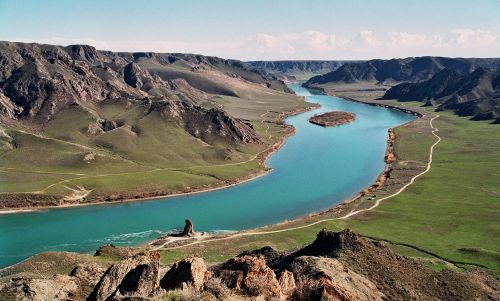AKIPRESS.COM -  Zhulduz Baizakova, a visiting research scholar (Fulbright Program) at the Near East South Asia Center for Strategic Studies at NDU, Washington DC, analyzed in her article "The Irtysh and Ili Transboundary Rivers: The Kazakh-Chinese Path to Compromise" the Kazakh-China conflict around the rivers of the Irtysh and the Ili.
Zhulduz Baizakova, a visiting research scholar (Fulbright Program) at the Near East South Asia Center for Strategic Studies at NDU, Washington DC, analyzed in her article "The Irtysh and Ili Transboundary Rivers: The Kazakh-Chinese Path to Compromise" the Kazakh-China conflict around the rivers of the Irtysh and the Ili.
More than 20 rivers cross Kazakhstan’s border with China, the largest of which are the Irtysh, Ili, Talas, and Khorgos Rivers. Today the two largest, the Irtysh and the Ili, are under increasing strain due to China’s water withdrawals.
This problem first emerged few years ago when China launched its so-called “Project 635” to construct, build, modernize, and develop 635 different facilities to boost the economy of its western provinces, predominantly the Xinjiang Uyghur Autonomous Region. As Kazakhstan is downstream of both rivers, it is thus put at a disadvantage.
The two fundamental issues between Kazakhstan and China are “rational and equitable” water allocation, and pollution prevention. Presently there is no universal solution to Kazakh-Chinese transboundary water issues, which are multifaceted and complex, and require a great deal of negotiations and compromise from both parties.
Today as a result of China’s uncontrolled water withdrawals, Kazakhstan faces grave environmental issues, since it is suffering water deficits across all water-related sectors, including the energy industries, agriculture, and metallurgy. Some even predict a drought in east Kazakhstan.
Other imminent threats could possibly follow: harm to fisheries; contamination of both surface and ground water; disruption of the water balance and natural equilibrium—as the Irtysh feeds Lake Zaisan and the Ili feeds Lake Balkhash both lakes will likely decline; increasing land salinity and degradation of pastures; environmental degradation; deterioration of the epidemiological situation; and last but not least, water shortage.
None of the Kazakhstan-China bilateral agreements address the issue of environmental damage or provide any institutional mechanisms to address it, whereas such mechanisms are clearly provided for in the Kazakh-Russian transboundary Agreement of 2010.
Article 3 of the 2001 Agreement obligates the Parties “to undertake appropriate measures and to make efforts to prevent or mitigate serious harm caused to a Party as a result of flooding and man-made accidents.” Wouters states that it is “clearly a duty of conduct and not of result.”
The same agreement contains a provision stipulating that one of the Parties must provide “important emergency information” upon agreeing the terms and conditions.
In other words, China has provided a general resolution, but has not institutionalized any clear-cut mechanisms for acting in the case that it triggers a serious environmental disaster.
Youn can read fuller article here.
